
Cyberghost crack Archives

cyberghost crack Archives
CyberGhost VPN review
CyberGhost is a Romanian and German-based privacy giant which provides comprehensive VPN services for more than 10 million users.
CyberGhost VPN boasts more than 7,100 servers across 89+ countries, a major leap since our last review when there were 'only' 4,800 servers in 58 countries. Torrents are allowed on many, although not all servers, and the company offers custom clients for Windows, Mac, iOS, Android and more.
Apart from the regular VPN functionality, CyberGhost includes a host of bundled extras. It can block malicious websites, ads and trackers. Automated HTTPS redirection ensures that the most secure connection possible is made to every website, and optional data compression can reduce bandwidth, maybe saving money on mobiles.
CyberGhost VPN supports connecting up to seven devices simultaneously. That's a little better than most (even the premium ExpressVPN only supports five), but keep in mind that these must be specific devices. Connect from a phone, or a games console, or a smart TV, just once, and that's one of your slots used up. If you run out of slots later on, you can log out of individual devices, but if this happens, it quickly becomes annoying,
Elsewhere, a web knowledgebase is available if needed, while chat and email support is on hand to help you through any particularly tricky bits.
We would like to tell you about the many new features CyberGhost now offers, but apart from the big increase in the server numbers and locations, there's not much to get excited about.
The apps don't support L2TP any more, for instance – your choice is IKEv2 and OpenVPN. Scratching around the release notes, we also noticed that the iOS app now has a Dark Mode, and there was a themed sticker pack available on Halloween. Well, uh, thanks. We think.
Editor's Note:What immediately follows is a rundown of the latest changes and additions since this review was last updated.
- Linux app got an update, with the main feature being the WireGuard support. (April 2020)
- The service now has over 6440 servers and 112 locations in 90 countries. (May 2020)
- The server coverage decreased to 6200+ servers in 89 countries. (July 2020)
- Due to a sale (probably), the 2-year and 3-year plan aren't available anymore, and the 1-year plan (with 6 extra months) is priced at $2.75. (August 2020).
Plans and pricing
Signing up for CyberGhost VPN's monthly account costs $12.99 a month, at the high end of the industry-standard $10-$13.
The price falls steeply as you extend your subscription, though, with an annual plan costing an equivalent $5.99 a month, dropping to $3.69 over two years.
The three-year plan is now $2.75 a month, up from $2.50 during our last review. It's still better than most – NordVPN's three-year plan is $3.49, for instance – but if price is your top priority, you might prefer Surfshark's two-year plan at just $1.99 a month.
Choose a CyberGhost deal and you're able to pay by Bitcoin, as well as PayPal and credit card.
There are free trials available, although they're more complicated to understand than usual.
Download and create an account via Windows, for instance, and you'll get just 24 hours to try the service out. Not only is this very short, you're also not getting access to the full service. The client doesn't enable using some of the specialist streaming connections, for instance, and every time you connect at all you're warned that all the 'free slots' are used up, and you must wait a minute or two. It only supports a single device, too.
You can get more trial time by signing up with the iOS app, giving you seven days. But you have to sign up with the app first. If you create your account via Windows, then sign in to your iOS app using the same account, its trial will also expire after 24 hours.
Install the Android app, though, and you don't have to create or log in to a CyberGhost account, which means you'll get your full 7-day trial, no matter what.
Confusing? Yep. The best approach is probably to start with the Android app, if you can, to get a feel for CyberGhost performance and see if you can access Netflix and other blocked sites. If you like what you see, pick a day when you've nothing else to do and spend it intensively testing the desktop client.
We would prefer a simpler scheme of things – would it really be so difficult to have seven days free, whatever your platform? – but at least CyberGhost gives you a chance to try before you buy. And if you do sign up and then find the service doesn't work for you, there is good news: the company has a lengthy 45-day money-back guarantee, one of the most generous deals around.
Logging and privacy
Like many VPNs, CyberGhost's website proudly boasts of a 'strict no logs policy' on its front page.
Unlike some VPNs, the service's privacy policy does a good job of backing this up, with some very specific statements: "When using the CyberGhost VPN, we have no idea about your traffic data such as browsing history, traffic destination, data content, and search preferences. These are NOT monitored, recorded, logged or stored by us.
"More than this, when using the CyberGhost VPN, we are NOT storing connection logs, meaning that we DON'T have any logs tied to your IP address, connection timestamp or session duration."
For customers who aren't sure about the technical details, the policy goes on to spell out the implications.
"We do NOT know at any time which user ever accessed a particular website or service."
"We do NOT know which user was connected to our CyberGhost VPN service at any given time or which CyberGhost VPN server IP they used."
"We do NOT know the set of original IP addresses of a user’s computer."
If you need more, a 'Does CyberGhost log? No!' support document adds a little extra detail.
The company backs this up to a degree with a Transparency Report where it lists DMCA, police and other requests it receives, and how much data it hands over. (Hint: none.)
While this is welcome, the reality is these are just words on a website, and there's no way for an individual user to know how the service actually works. Some VPN providers (NordVPN, VyprVPN) are addressing this by having independent audits run on their systems, and we hope CyberGhost and the rest of the industry will soon do the same.
In the meantime, we can at least run some basic privacy checks of our own, using sites such as IPLeak.net and DNS Leak Test to look for DNS and other privacy leaks.
None of the tests revealed any problems, and an issue we spotted during the last review – connecting from the UK to New York, and being allocated a US IP, but a UK DNS address – has been fixed. Wherever we connected, we now received a DNS IP address from that country, just as we'd expect.
Performance
Measuring VPN performance is difficult as there are so many factors involved, but we tried to get an idea of CyberGhost speeds by testing local UK and US performance with benchmarking websites including SpeedTest and TestMy.net.
Our nearest UK servers delivered very acceptable speeds, averaging around 65-70Mbps on our 75Mbps fiber broadband line.
The added encryption of OpenVPN reduced performance, inevitably, but CyberGhost still only cut our speeds by around 6-7%, a minimal overhead.
We carried out US tests on a 600Mbps connection, but speeds were slower than in the UK, at 30-75Mbps.
These tests took place in late March 2020, though, when many people were working from home to reduce their coronavirus risk. It's highly likely that our results were affected by the increase in internet traffic, although there's no way to tell that for sure, or know how much of a factor it was.
The best we can say is that CyberGhost managed below-average speeds, even by coronavirus era standards (other VPNs reviewed recently have done better). But because of the exceptional circumstances, we're not going to mark the company down for this.
Netflix
Unblocking Netflix with a VPN and similar sites can be a challenge, even with the best services. That's because most providers won't tell you which servers work, and which don't, forcing you to work down every server in the target country until you finally get lucky.
CyberGhost's apps seem to make life much easier by highlighting locations which support the services you need. When we chose the Streaming filter in our Windows client, for instance, we saw recommended locations for US Netflix, Hulu, Amazon Prime, Disney+, YouTube TV and more, along with other specialist servers for Canada, France, Germany, Finland, Poland, Brazil and more.
The UK servers worked for us, bypassing the BBC's VPN detection and allowing us to stream iPlayer content without difficulty.
Viewing US Amazon Prime can be tricky, but CyberGhost got us in, and we were able to stream US content from the UK without any issues.
Accessing Disney+ was our only problem. We connected to CyberGhost's recommended streaming location, but found that disneyplus.com mostly didn't respond, and our absolute best result was a 503 error (web server-speak for 'sorry, you can't have that content right now').
Disney Plus had just launched in Europe at review time, so it's possible that the server was just overwhelmed, especially with a potentially huge housebound audience, courtesy of various coronavirus-related lockdowns.
Whatever the cause, as we weren't able to see whether Disney Plus detected our CyberGhost connection, we're not going to count this issue as a black mark for the service.
Torrents
While some VPNs hide their torrent-friendly status, CyberGhost is rather more upfront. Just launch the Windows client, for instance, and you'll find one of its server lists is titled 'For Torrenting'.
There are some helpful tweaks buried in the Settings, too, including the ability to automatically connect your preferred CyberGhost connection whenever you launch your torrent client (more on that later).
Bonus features include a malicious URL filter, enabled by default, which could help you avoid a lot of trouble.
If you ignore the VPN 'For Torrenting' list and connect to a VPN location manually, there is some scope for problems. CyberGhost explains that "we have to block P2P protocols on certain servers, either due to strategic (this is traffic that unnecessary slows down other user's traffic) or due to legal reasons in countries where we are forced by providers to block torrent traffic, among them USA, Russia, Singapore, Australia and Hong Kong."
If you stick to the recommended list, though, CyberGhost works well, and overall, it's a simple and straightforward way to anonymize your torrenting activities.
Client setup
CyberGhost does its best to make sure the setup process is as easy as possible, and for the most part it's very successful.
Clicking the Trial link on the website quickly downloaded the tiny Windows installer. We accepted the terms and conditions, entered our email address and password, and after clicking the usual 'please confirm your address' link in a follow-up email, that was it. We were ready to go, with no payment or other details required.
It's much the same story with the mobile apps. The CyberGhost site links you to each app store, and you download and install the apps in the usual way.
If you need the OpenVPN configuration files to set up a router or other device, though, your life becomes considerably more complicated. While other VPN providers typically give you a bunch of standard .OVPN files to download, CyberGhost asks you to go through the following lengthy process: Log in to your account; add a device profile; choose the features you need (ad blocking, data compression, malware protection, more); choose OpenVPN TCP or UDP; choose your target country; note down a server name, custom username and password; and download the .OVPN file, certificates and key files in a ZIP file.
If you're looking to set up multiple locations, you must also rename each .OVPN file to something appropriate.
This approach has some advantages – it's secure and gives you a high level of control over how each connection works – but if you're just hoping to download 50 standard OpenVPN configuration files, get ready for disappointment. There's a lot of setup work to do.
Windows client
CyberGhost's Windows client opens with a clean, lightweight interface: a simple console with connection status, a list of locations and a Connect button.
Don't be fooled, though – there's a lot of functionality tucked into a right-hand panel which you can open whenever you need it. A location picker lists all servers, along with their distance and current load. You can filter this to display servers optimized for streaming or torrents, and a Favorites system makes it easy to build your own custom list.
Right-clicking CyberGhost's system tray icon also displays all the available servers, with submenus for torrenting, streaming and your favorites. You can opt to choose, switch and close connections without ever bothering with the main client interface.
Options start with a Connection Features panel, where you can enable privacy features including blocking for ads, trackers and malicious websites. CyberGhost can automatically redirect HTTP connections to HTTPS for extra security, and a bonus Data Compression feature compresses images and 'other elements' to reduce traffic and improve performance.
While that sounds impressive, these extras aren't always worth very much.
When we turned on the ad blocker and accessed an ad-packed UK newspaper site, for instance, our browser made 671 requests, downloaded 5MB of content and took 43 seconds to fully load.
When we disabled CyberGhost's ad blocker and switched to uBlock Origin, the same page made 156 requests, transferred 469KB of data and loaded in 3 seconds.
A Smart Rules panel is far more useful, and gives you an unusual level of control over how the client works. Most VPNs have an option to launch when Windows starts, for instance, but CyberGhost also allows you to connect to your preferred server, and automatically launch a particular app, such as your default browser in incognito mode.
There's even more flexibility in the Wi-Fi Protection panel, where CyberGhost allows you to decide exactly what happens when you connect to new networks. You can have the client automatically connect to the VPN if the network is insecure, for instance; never connect if it's encrypted; perform custom actions for specific networks (always protect at home, never protect at work), or simply ask you what to do.
The surprises continue everywhere you look. App Protection can connect you to a specific location when you open an app, for instance. No need to remember to enable the VPN before you use your torrent client – CyberGhost can automatically do it for you.
There's another handy touch in the Exceptions feature, where you can build a list of websites which won't be passed through the tunnel. If a streaming site is only accessible to users in your country, add it to CyberGhost's Exceptions and it'll never be blocked, no matter which VPN location you're using.
If this sounds too complex, and maybe you're only after the VPN basics, no problem; it can all be safely ignored. You'll never even see it, unless you go looking. But if you'd like to fine-tune the service, optimize it to suit your needs, CyberGhost gives you a mix of options and opportunities you'll rarely see elsewhere.
Elsewhere, the Settings box enables choosing your preferred protocol (just OpenVPN or IKEv2, L2TP support has been dropped), using random ports to connect (which might bypass some VPN blocking), and enabling or disabling a kill switch, IPV6 connections and DNS leak protection.
Our tests showed the kill switch worked very well. Whether we forcibly closed an OpenVPN or IKEv2 connection, or even killed the openvpn.exe process entirely, the client spotted this, raised the alarm (sometimes a little slowly, but eventually), and automatically reconnected, without ever exposing our real IP. That's a tough test, but CyberGhost passed it without difficulty.
Mobile apps
CyberGhost's iOS app is far simpler than its desktop cousins, with much less functionality and a relatively basic interface.
The iOS app opens with little more than a Connect/ Disconnect button, for instance. By default, it connects to your nearest server, but you can also browse a list of locations. Tapping a location displays load information, including the number of connected users, and you can save specific locations to a Favorites list.
Settings are minimal – you can't even choose your protocol – but the app does a good job of helping you define how it should be used with particular networks.
When we first launched the app, for instance, it displayed our nearest Wi-Fi network name on the opening screen. That's unusual, but a very good idea, as it helps you see what you're using to connect. If you tap the name, you can specify whether you want CyberGhost to automatically protect it in future, or prompt you to decide each time. And the app can save the appropriate actions for all the networks you use regularly, so it knows exactly what to do at home, work, the coffee shop or the library.
The Android app doesn't display your current wireless network, unfortunately, but the feature list is longer, with many desktop features included.
There's a Favorites list for storing your most commonly accessed locations, for instance, which is especially handy on a mobile device where it's less convenient to find items on a lengthy list.
Although there's no choice of protocol (it's OpenVPN-only), you do get the desktop client's ability to use a random port when connecting to the VPN, a simple trick which might help bypass VPN blocking.
Split tunneling is probably the highlight, allowing you to decide which apps use the VPN and which don't, in just a few clicks.
The app includes many of the connection extras you'll see with the desktop build, too: ad and tracker blocking, data compression, and URL filtering to keep you away from malicious websites.
Overall, CyberGhost's mobile VPN apps aren't bad, but they're still short of some of the core functions you'll often see elsewhere (kill switch, a choice of protocol and protocol settings), and there's plenty of room for improvement.
Support
Point your browser at the CyberGhost support site and it's hard not to be impressed by the sheer weight of articles. There are guides for Windows, iOS, Mac, Android, Linux, Kodi, consoles and routers, along with troubleshooting articles and assorted other FAQs.
When we looked more closely, though, we began to spot plenty of issues. These start with how the articles are organized. We would expect installation issues to have a section all on their own, for instance, but instead they're spread around and mixed with other articles. You can search the articles for keywords, but this doesn't help very much, as the results don't seem to be sorted by usefulness.
Article content is often poor, too. We headed off to the Troubleshooter's 'Connection and speed problems' section and noticed that there wasn't a single guide offering generic speedup advice (connect from a different network, connect to a different location, try a different protocol, reboot your hardware – you know the drill.) Instead, we found pointless content like this: "If you use UMTS boards to connect to the Internet, you normally install that board's software as well. These programs may cause problems, when using CyberGhost VPN, surprisingly even after stopping using the UMTS board."
That's not a snippet, we've not edited it or left anything out. It's the entire article. Previous CyberGhost users seem to share our view – the article states that '0 of 9 found this helpful' – but CyberGhost either hasn't noticed or doesn't care.
Out-of-date guides are a problem. We searched the support knowledgebase for the keyword 'OpenVPN', and the first 10 hits were all three-years-old.
Other articles included some questionable advice. The very first practical suggestion for "What to do if CyberGhost seem to slow down your Internet connection" is to change your MTU from 1500 to 1300. That's way too low-level and drastic as a first step and could easily slow down your non-VPN connections, too, but CyberGhost doesn't give you a hint of that, or warn non-technical users to undo the step if it doesn't work.
Some of these articles appear to have been poorly translated from the original, too ("in daily life quite a few adversenesses influence the real possible speed"). Although they're still generally understandable, this means the content isn't always as precise and clear as it needs to be.
You can also talk to a real, live, human being, fortunately, via email and live chat support. CyberGhost does its best to hide the chat support – you must click a Help button bottom-right, then enter a keyword to search the knowledgebase, before the Chat button appears – but we found it eventually.
One click and a couple of minutes later, a support agent was responding to our question. Despite us choosing a slightly technical topic on the generation of OpenVPN configuration files, he immediately understood what we needed, and clearly explained everything we needed to know.
CyberGhost's support site may be dubious, then, but that's not the end of the story. If you're running into problems, there's a good chance that the live chat support will quickly point you in the right direction.
Final verdict
CyberGhost is a capable VPN service with a highly configurable Windows client, packed with features yet still easy to use. The mobile clients are much more ordinary, but there's still plenty to like here, from Netflix and iPlayer unblocking to low three-year prices and helpful live chat support.
- Also check out the best VPN services of 2020
Your satisfaction is our first priority

A.M.A. Freight Logistics S.A.R.L.
Air freight
Door to door services; Charter services; Consolidation; Special projects; Small parcel services; Dangerous ...
Sea freight
Door to Door Services; Full Container Load (FCL); Consolidation (LCL); Special Projects; Dangerous ...
Land Transport
Door to Door Services; Full Truck Load (FTL); Consolidation (LTL); Special Projects; Small Parcel ...
Groupage & distribution
You are not ready to load your own container or send your goods through Freight Express Services, A.M.A offer you ...
Supply chain management
You need a product overseas or have a specific project that requires special care, our dedicated team can provide a ...
Customs Clearance
Quick, Effective, and Personalized Clearance. Release of goods at all ports of entry; Release of goods from ...
They have trusted us
CyberGhost VPN 2020 Review: Fast & Cheap, But is it Safe?
CyberGhost is a fast, reliable VPN with a budget-friendly price and, with its latest discount, it’s even more affordable! But not every VPN is as good as it claims. Could CyberGhost be weaker on safety? I put the service through hundreds of tests to find out.
Whether you’re interested in its speeds, server network, or security measures—or just want to know if it’s reliable for gaming—I have all the answers you need.
After my extensive testing, I’d say CyberGhost is a solid choice. It has a lot to offer, especially in terms of ease of use and hopping onto your favorite streaming platforms, so it’s ideal if you’re a VPN newbie. But I did find a few areas where CyberGhost simply can’t compete with other elite VPNs.
Get Started With CyberGhost Now!
Short on Time? Here’s What Matters Most
CyberGhost is a popular VPN, and it’s easy to see why. Its apps are intuitive and easy to use, its connections are fast and reliable, and it guarantees access to sites with the toughest geoblocks around. In some ways, it even outshines competitors NordVPN and ExpressVPN, especially in terms of server count and allowable simultaneous connections.
But the true test of any VPN goes way beyond look and feel, so I put this VPN through its paces by testing every feature it has to offer. I also ran lots of external tests, checking its speeds and whether there were DNS leaks. I even tested its customer service and how its apps work across a range of different devices so you know exactly what to expect.
My field operatives and I have tested a lot of VPN services—over 300 to be exact—and CyberGhost has me impressed. You’ll find plenty of leading features, like optimized servers and a built-in ad blocker. But one thing that stood out to me during my tests was the simplicity of the apps—and this is a good thing, rather than bad. CyberGhost really comes out on top with ease of use.
Streaming – Does CyberGhost Work With Netflix?
Yes, you can stream Netflix with CyberGhost. We tried the UK and US libraries first as they’re the most popular, and we didn’t encounter any geoblocks. One of our operatives in Spain confirmed unrestricted access to the UK library, while I jumped on a US server from the UK. I was very happy to see that my speeds didn’t slow down while streaming Netflix US, especially considering that my data traveled around the world and back.
I then tried other major Netflix libraries, including Canada, Australia, and the Netherlands, and I didn’t experience any problems with these, either.
I even tested less popular libraries like Spain and Japan, and they worked, too. I didn’t see any noticeable speed loss while connecting to servers around the world, other than in Australia. Connecting there caused a small amount of buffering, but nothing that ruined my stream. If Netflix is your top priority, CyberGhost is a good choice.
There’s even a special feature that makes CyberGhost ideal for watching TV and movies: optimized streaming servers. During our initial tests, we accessed Netflix US and UK by manually finding the right servers, but then we tried the optimized streaming servers. All we had to do was use the For Streaming tab, look for Netflix, and click—the app automatically connected us to the ideal servers.
You’ll also find servers optimized for plenty of other streaming services, including Disney+, Hulu, BBC iPlayer, YouTube TV, and Sling TV.
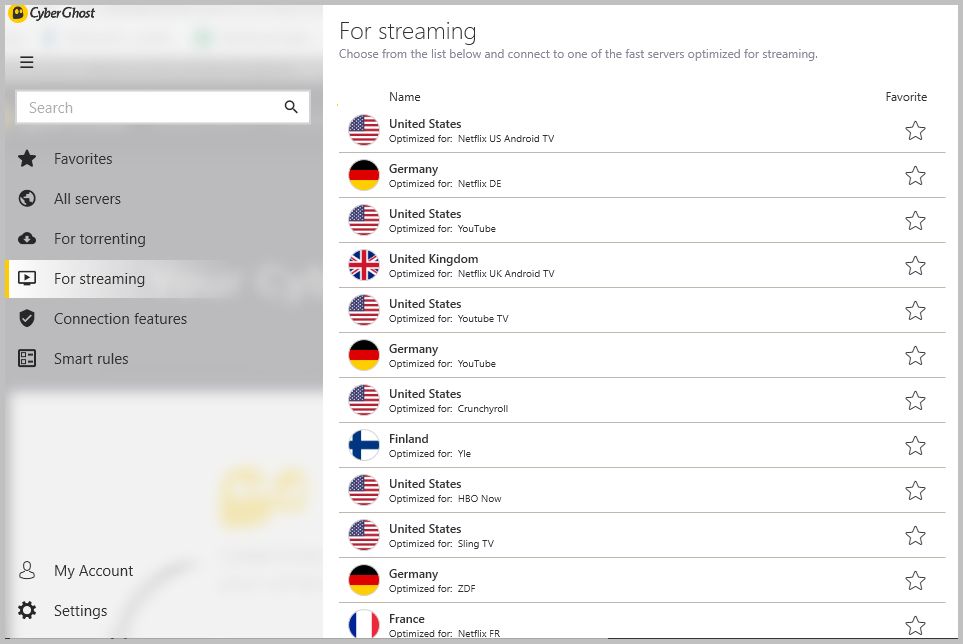
Speaking of other streaming services, I tested CyberGhost with several of them, too. Here are my results:
- BBC iPlayer: I could easily access BBC iPlayer, both with and without the optimized server.
- Hulu: After a recent test, I can now confirm that Hulu is accessible but only if you use one of CyberGhost’s Hulu optimized servers.
- Sling TV: Yes, it’s easy with an optimized server.
- Comedy Central: Yes, no problems here.
- Amazon Prime Video: Yes, just by manually connecting to a server.
- Disney+: I tried the optimized US server and got access. I also tried servers in all other Disney+ locations and had no problems.
If Netflix is your main source for streaming, you’ll have no trouble accessing it with CyberGhost. Just keep in mind that streaming optimized servers are only available on paid plans. You can also check out these top vendors, though, as there are two other leading providers that beat CyberGhost when it comes to performance.
Want to know more? Go back to the topic list.
Start Streaming With CyberGhost!
Is CyberGhost Good for Torrenting?
Yes, CyberGhost is a strong choice for torrenting. In fact, it even has specialized torrenting servers designed for P2P sharing at high speed, while always maintaining your anonymity and security.
Click on the For Torrenting tab to find P2P-optimized servers—there are 80 locations from which to choose, so you can easily find one near to you.
You can also see the number of users on each server, the load percentage, and how far away the server is from you. These are helpful details to have since you can quickly connect to a server that’ll offer you the best speeds, rather than using trial and error to find the right one. You can also add P2P servers to your favorites list if you encounter some that work especially well for you.
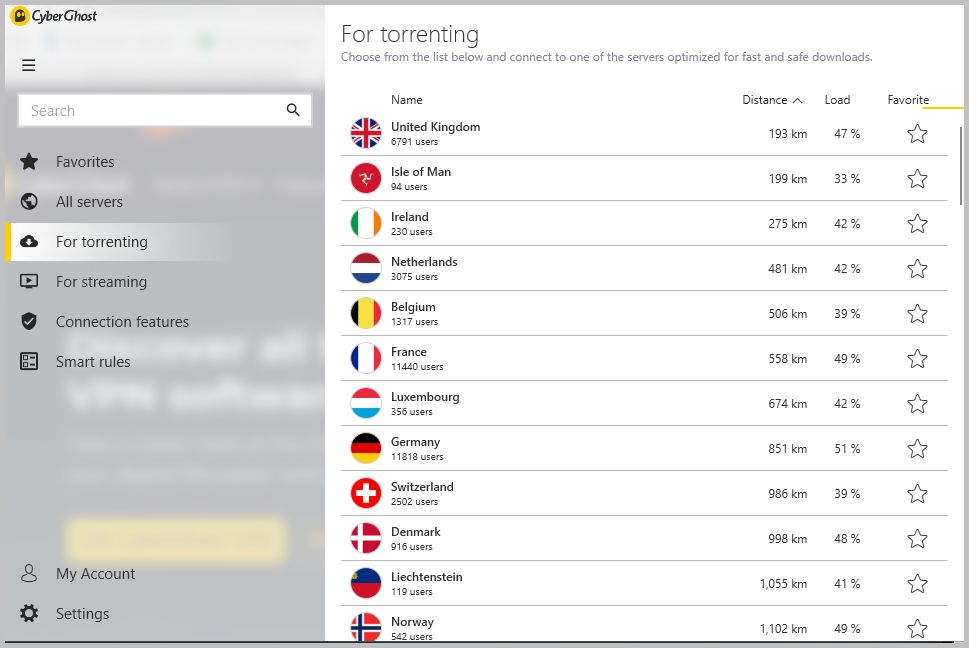
I tried servers in the US, Germany, and Mexico so I could assess speeds over different distances. I was able to share files with my friends easily and quickly on all servers. The Mexico and US servers were noticeably slower than the Germany server due to my location in the UK, but not so slow that sharing files was a struggle.
CyberGhost uses advanced encryption, a strict no-logs policy, and perfect forward secrecy to make sure you’re secure while P2P sharing. None of your activity is retained, so there’s no information that can be traced back to you.
One thing you should know: Torrenting is only available on desktop. And there’s room for more improvement, too. CyberGhost doesn’t offer a SOCKS5 proxy—this is a maximum security proxy that offers improved upload and download speeds, so it’s particularly good for torrenting. I’ll be on the lookout for this in the future, but in the meantime, you can use NordVPN if you prefer this capability.
CyberGhost Speeds
CyberGhost is reliable when it comes to speeds, especially with its Best Server Location feature. Simply click the power button, and it finds you the best server based on latency, speed, and distance from your location.
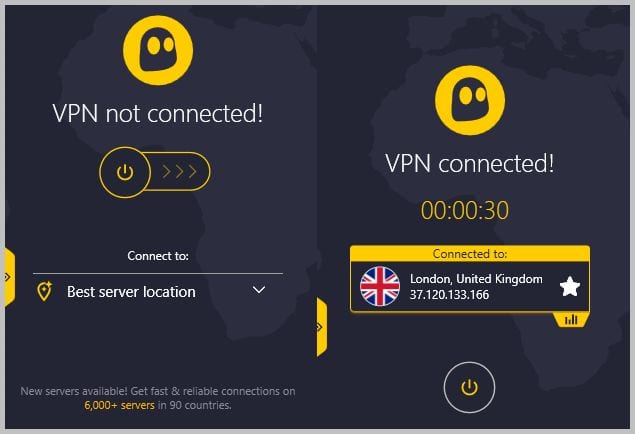
Most VPN speed tests are pointless – they give you seemingly random speeds without any real context. But I’ve taken the time to give you a more comprehensive set of speed tests. How fast a server appears to be on a speed test is meaningless if the performance is lacking – so I tested both speed and performance – including for high-demand activities like gaming and streaming.
Seeing as I’m in the UK, the app always connected me to another UK server when I tried it, and when I put it through speed tests, it definitely delivered on performance. I was able to stream BBC iPlayer in HD and load webpages in seconds, just as if I was on a non-VPN connection. But I did find a few results that surprised me the further I went.
Local Speeds
I tested my base speed first so I had something to which to compare my results.
Without a VPN, I was at 60.2 Mbps download, 42.2 Mbps upload, and 28 ms ping.
I then used the Best Server Location feature, which connected me to a UK server. My VPN-connected download speed was 56.7 Mbps, which means it only decreased by 5.8%—still remarkably fast. I was able to stream, game, and browse with absolutely no lagging.
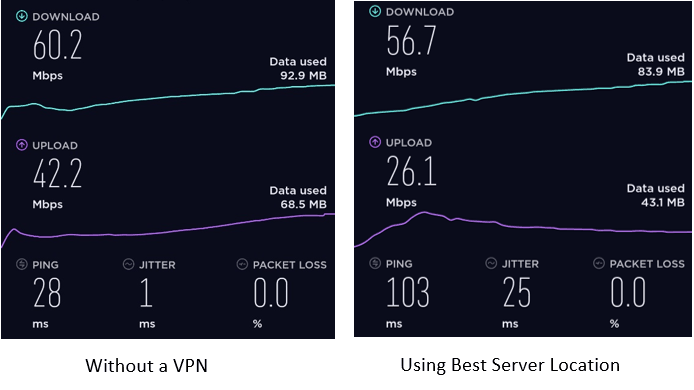
I expected great results since I’d used the Best Server Location feature and the server was optimized for me. So I tried another local server—one I manually located. This time, my download speed was 48 Mbps and my upload speed was 3.53 Mbps.
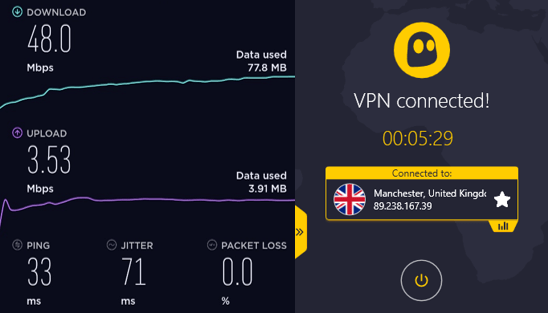
This means my download speed decreased by 20%. While this sounds high, a download speed of 48 Mbps is still incredibly quick, so I had no problems while browsing and streaming. In fact, it was just as smooth as my regular, non-VPN connection. Netflix UK continued streaming in HD, and I could load webpages in just seconds.
However, my upload speed did take a hit. It decreased by nearly 92%, which caused poor quality on my WhatsApp and Skype video calls.
Long-Distance Speeds
First, I connected to a random US server in New York, which gave me a speed of 30.5 Mbps. This was a speed decrease of 49%.
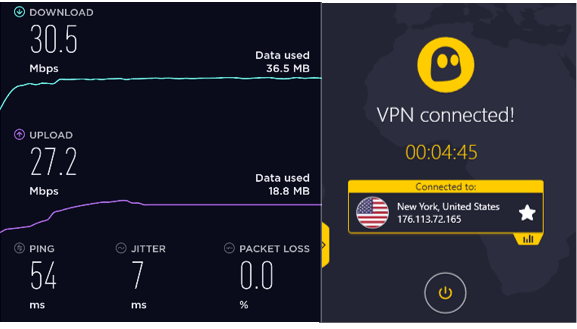
I expected speed loss as my data was traveling from the UK to the US. The truth is that a lot of VPNs I’ve tested cause a significant drop in download speed over this level of distance. However, 30.5 Mbps is still speedy, so I’m impressed. I was able to stream in HD quality once videos had buffered for about 60 seconds.
It’s also worth mentioning my upload speed here. It stayed at a steady 27.2 Mbps, so I was actually able to upload large email attachments and images quicker than when I was connected to a local server.
Next, I decided to connect to a US server optimized for Netflix to see if my speed would increase at all. And it did.
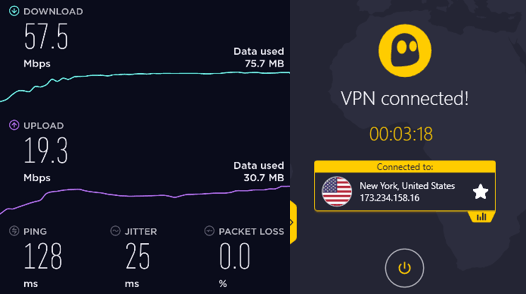
I had a download speed of 57.5 Mbps, which is an increase of 88% over the randomly chosen US server. And from my base speed, it was only a slight decrease of 4.5%. The quality of my Netflix stream improved remarkably—there was no buffering as there had been with the previous New York server. I stayed on Netflix for five hours, and I streamed in HD the whole time.
Continuing my speed tests, I headed over to a Canada server. And this is where my speed loss really started to show. My download speed decreased by nearly 94% to just 3.69 Mbps.

I definitely noticed the speed loss while browsing and streaming. It took ages for pages to load, and my streams buffered, with some episodes displaying poor quality. These speeds didn’t prevent me from watching anything at all, but it was extremely frustrating.
My upload speed was cut by almost 88%, too. Interestingly, it didn’t decrease as much as when I connected to a local server, but it still made uploading files and attachments much slower.
Finally, I connected to a server in Singapore and saw similar results. My download speed slowed down to just 1.71 Mbps.

It was hard for me to do anything at this speed—even a simple internet search. The upload speed of 0.58 Mbps made video calls impossible, too.
CyberGhost Speed: The Results
My tests started off well, with little decrease in my speeds, so I was able to continue with my online activities as I usually would. The optimized streaming servers are noticeably faster, which is good. This drastically improves the quality of your stream, so you don’t need to sit through annoying buffering or lagging.
However, when distance was put to the test, the speed loss started to show. My speed took a real hit when I connected to the Canada and Singapore servers, even though they only had between 40 to 50% load. In fact, the Singapore server only had 552 users connected at the time, so I expected speeds around 20 Mbps—definitely not as low as 1.71 Mbps.
While CyberGhost might be good for local speeds and streaming through optimized servers, it doesn’t deliver fast connections everywhere, especially over longer distances. If you need a faster VPN, check out our top speed picks—we ran tests on all leading vendors, with CyberGhost claiming spot #5, so there are four better options if you need them.
Want to read even more? Head back to the topic list.
Is CyberGhost Good for Gaming?
Gamers always pay attention to the details—especially when it affects their gameplay. But even if you don’t play, you can still learn a thing or two about CyberGhost by putting it through gameplay testing. Gaming is speed-intensive, and if you’re limited on bandwidth or experiencing a significant speed loss, you’ll know about it—buffering and lagging will make it harder to keep up with your teammates and keep your head in the game.
To see how fast CyberGhost really is, I put it to the test with World of Tanks. I connected to a faraway server to see how distance would affect the quality of my game. I was paying particular attention to my ping rate. Ping is important because a lower result indicates lower latency, which means it takes less time for game data to update—lower latency equals less lagging.
I tested World of Tanks on a US server on my Windows PC, Android Phone, and PS4, and I had great results on all. I had a steady download speed of 25.3 Mbps. While not as fast as some other vendors I’ve tested, it’s definitely quick enough to play the game without noticeable speed loss. My game was free from buffering, so I didn’t miss out on any important battles.

My ping was 131 ms. Although it increased significantly from my base ping speed at 28 ms, there was very little lag. I managed to keep up with the fast-paced game with no problems.
When I tested a different server in Canada, though, I didn’t get the same gaming experience. It was full of buffering and almost cost me my entire game.
CyberGhost is a good choice for gaming if you select a server close to you or stick with a US server, where it offers the best coverage and generally the quickest speeds. If you want a VPN that’s completely reliable for gaming anywhere in the world, though, check out our review of the best VPNs for gaming.
Security
When I test VPNs, I always score those with advanced security features more highly. That means looking at encryption levels, security protocols, and extra security features like kill switches and leak protection. You might think a VPN is secure, but if you don’t know what you should be looking for, it’s hard to tell for sure.
CyberGhost offers the highest level of encryption available, AES 256-bit. The 256 refers to the actual size of the encryption key. Putting that into perspective helps to understand why it’s important: 50 supercomputers that could check a billion billion AES keys per second would require 3×10^51 years to crack a single piece of your data. This means that even if a hacker did intercept your information, the criminal would still not be able to read it.
The encryption combines a 4096-bit RSA key and SHA256 authentication with the AES 256-bit encryption. The RSA key acts as an encrypted handshake. When your data arrives at its destination, the key is used to acknowledge that your information has come from the right place—your device. The SHAA256 authentication is what decrypts your data so it can be understood.
SHA256 is highly secure, but it’s not quite as safe as SHA512, which other services like ExpressVPN offer. If you’re using a VPN for P2P sharing, you need the highest level of authentication you can get so that only the sender and receiver have access to the shared secret key that can decode your data. Still, SHA256 keeps you safe and shields you from man-in-the-middle attacks, so you don’t need to worry about any data leaks.
CyberGhost offers a variety of security protocols, including OpenVPN TCP/UDP, IKEv2, and L2TP/IPSec (on limited servers). The apps automatically select the best protocol for you based on your activities and whether you need more speed or security. However, you can also configure the app to always use a certain protocol if you prefer. Take note: The mobile app only uses OpenVPN. This isn’t a bad thing though because it’s the only protocol you really need, as it’s configured to offer speeds and security in one.
There’s also a WireGuard protocol that I’ve not seen with many other VPNs. It’s fairly new, using OpenVPN’s security with IKEv2’s speeds to provide an even better online experience. Before you get too excited, it’s only available for Linux users.
If you’re using OpenVPN, CyberGhost lets you use the random port connection feature. This means you can still access non-HTTPs sites securely, as it scans a wide range of ports to connect to when you visit a website, rather than just port 443 for HTTP-secure sites. Public WiFi, especially in hotels, usually only lets you visit HTTP-secure sites, so this gives you added flexibility and security. And it’s automatically enabled in the app, which I like to see.
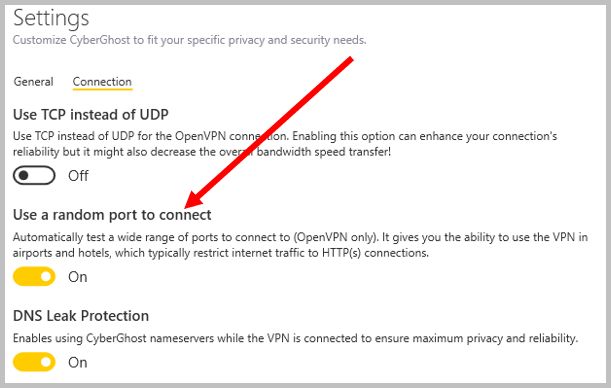
You have more security through perfect forward secrecy. This changes your encryption key each time you log on. If a hacker was able to decrypt your key during your session, they couldn’t use that same key to access data from any other time you’ve used the VPN. It ensures anything from your other sessions stays completely secure, even if one connection is compromised.
Want to know more? Jump back to the topic list.
Kill Switch
If you want to make sure you’re really secure online, especially when you’re browsing geoblocked sites or sharing sensitive data, you need a kill switch. Most leading VPNs offer this feature, which protects you when something goes wrong with your VPN connection. Kill switches block your traffic when your VPN connection is lost so you aren’t accidentally exposed.
As I expected, CyberGhost has a kill switch automatically enabled in the app, so you don’t even need to turn it on—you’re already protected if anything interrupts your connection.
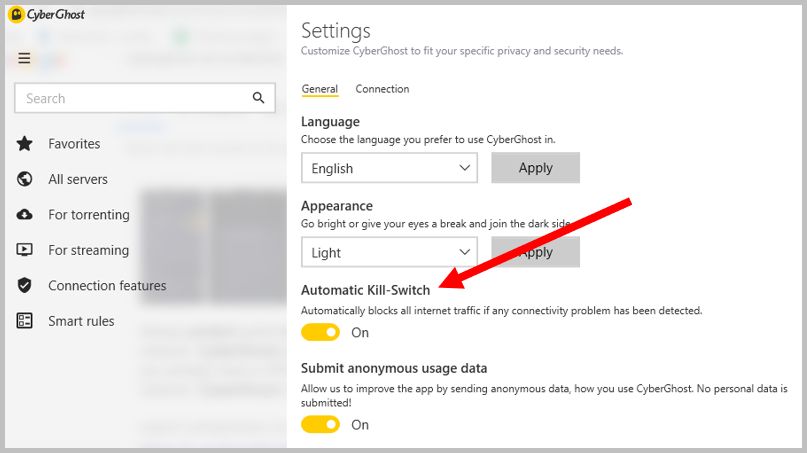
Split Tunneling
Like more control over apps and your internet connection? Then a VPN with split tunneling is ideal. This feature lets you decide which apps go through the VPN. You can add and remove apps as necessary, so anything you leave out will use your local IP address instead. Some common apps to leave outside the VPN include your online banking, social media, and any domestic streaming sites that you couldn’t access without being in your home country.
I’ve tested a lot of VPNs, and I’ve only found a handful that actually offer split tunneling. But CyberGhost is on the list. It has a dedicated split tunneling feature on mobile and an Exceptions feature on desktop that functions just the same—it’s not quite as seamless as I’ve seen with other VPNs, but it works just fine. To use it, simply add website addresses or remove the tick next to your apps on your mobile.
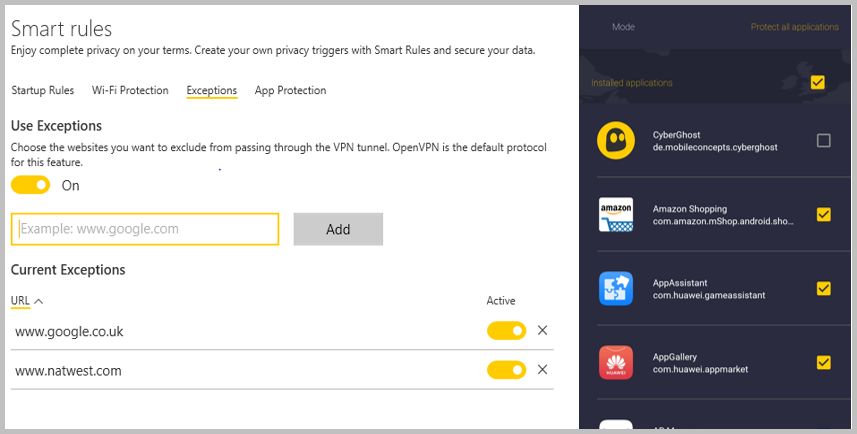
I tested the split tunneling from the UK, and I was able to check my bank balance while streaming Netflix US on a US CyberGhost server. And my tests showed something else great about CyberGhost’s split tunneling feature, too.
On the desktop app, you have an App Protection Feature that basically functions like split tunneling, but better. Add protected apps to your list, and CyberGhost will automatically launch and connect to a specified location as soon as you open one of those apps. I tried it with Netflix, and it worked flawlessly. It connected me to a US server automatically, so I was able to head straight to Netflix US without any other manual configuration. This is amazing for ease of use, and I haven’t seen another vendor offer this feature.
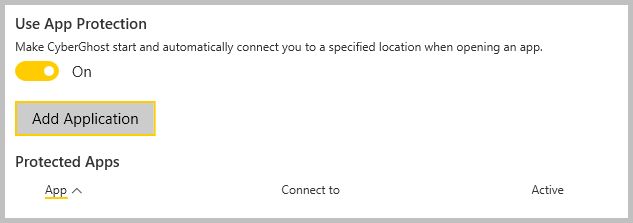
Just remember, when you use split tunneling, anything you leave outside of the VPN is unencrypted. Don’t leave out any apps that require anonymity or need to bypass geoblocks.
Leak Tests and Leak Protection
An external leak test is the best way to see how well a VPN hides your data and browsing traffic. Some VPNs claim to keep you protected, but you can’t always be sure.
CyberGhost is one of the top vendors for leak protection, as it offers DNS and IP leak protection in its apps. These are already switched on, so even if you’re a VPN newbie and aren’t sure what they are, you’re protected without having to worry about it.
I wouldn’t recommend ever turning these settings off. You can disable the IPv6 protection to use local connections, but I’d just use the split tunneling feature instead as you remove all protection if you disable this feature.

I put CyberGhost to the test using ipleak.net to see whether there were any faults and potential leaks in my connection. I tried seven different servers: UK, US, Canada, France, Germany, Australia, and Hong Kong. I didn’t experience DNS or IP leaks on any server.
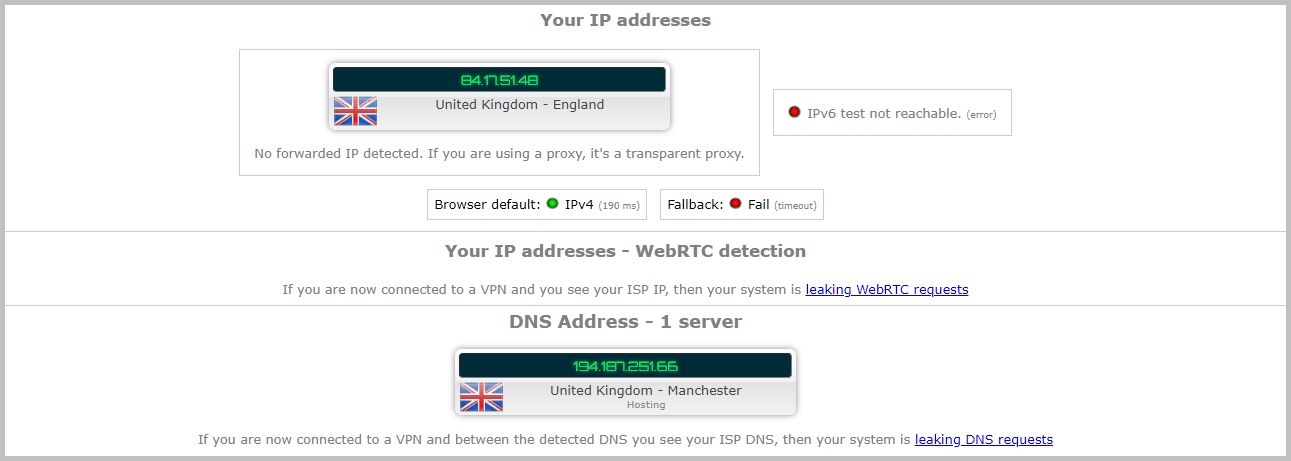
My IPv6 test was unreachable, which means my ISP was unable to assign me an IP address—it couldn’t find my device. In fact, there was no request even sent to my ISP from my device, which means I was completely anonymous using CyberGhost’s servers.
Tor Compatibility, Security Audits, and Security Breaches
CyberGhost is compatible with Tor. To benefit from Tor over VPN, just connect to a server and then launch the Tor browser—I tried it, and it worked just as expected. CyberGhost’s process is not as seamless as NordVPN’s connection (which doesn’t even require the Tor browser to access the Tor network), but it’s rare to find a VPN that works with Tor, so I’m happy to see CyberGhost has us covered.
In 2012, CyberGhost’s safety processes were audited and verified by QSCert, which is renewed each year. However, there’s no evidence of any independent security audits, like other competitors have done. These are especially important, not just for transparency with users, but for backing up the security claims that a service makes.
CyberGhost releases a Transparency Report every three months. It provides information about malware activity flags, key statistics about its infrastructure, and the people behind CyberGhost. This is the kind of honesty I like to see from a leading VPN.
However, I’d like to see CyberGhost take steps to perform external audits, especially of its no-logs policy and server security standards so we can see how secure it really is. Although, having run all the security tests possible on CyberGhost, I’m confident it’s secure and you won’t experience any leaks.
In 2019, Typeform experienced a breach that leaked 14 CyberGhost usernames. Luckily CyberGhost operates a strict no-logs policy, so no passwords or personally identifiable information was leaked.
WiFi Protection
CyberGhost offers extra security through WiFi protection on both its desktop and mobile apps. You can have the VPN launch automatically when you connect to certain WiFi networks, which is especially useful if you’re on unsecured public WiFi and need the added protection. You can also set it to ask whether you want to connect to or ignore certain networks.
This added security is a convenient feature to have, and it makes sure you’re safe from prying eyes, especially in restaurants, in bars, and on public transport—hacker hotspots. Even better, it’s already switched on for you in the app.
HTTPs Protection
Something else CyberGhost offers is automated HTTPs redirect. This feature forces your connection to a HTTPs-enabled site, so you only visit the most secure version of a website. It protects you from malicious attacks on unsecured websites, where personal data like credit card details and your mailing address are easily exposed to anyone watching.
Privacy
Just like you want to know you’re secure while using your VPN, you also need to know that your privacy is being maintained. There’s no point in having the highest standard of encryptionif the service retains your personal information or uses cookies and trackers to build your online profile. You need to be anonymous and secure. Thankfully, CyberGhost offers just that.
Location
CyberGhost’s headquarters are in Romania, a privacy-friendly country. Romania is also not part of the 5/9/14 Eyes Alliance, so companies operating here have no obligation to share information they hold with any government.
Who Owns CyberGhost?
CyberGhost is owned by Kape Technologies, a cybersecurity and digital protection investment company based in London. Private Internet Access and ZenMate are also in the same group.
Does CyberGhost Have an Adblocker?
Yes. CyberGhost has an ad blocker in all of its apps, which you can turn on in your settings.
CyberGhost offers protection against ads, tracking, and malware. I suggest you turn on all three of these for maximum protection; that way, you’re protected from annoying pop-ups and anything else that might infect your device or expose you.
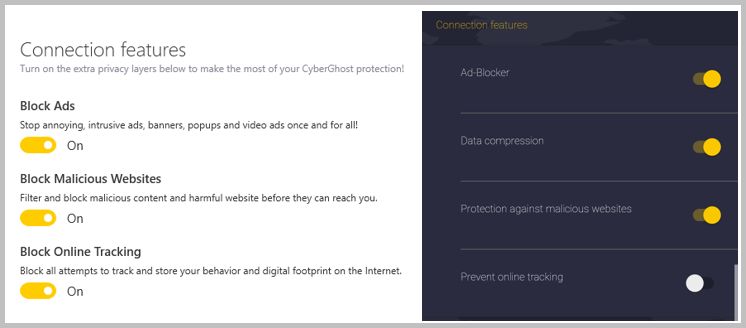
I put the ad and malware protection to the test, and it functioned great. It even blocked ads on Facebook. These blockers made my browsing experience much faster as I didn’t need to wait for ads to load.
However, I’d be more impressed if there was just one blocker that included protection against all three risks. I’ve tested other VPNs that offer all-in-one protection, and they’re definitely easier to use. Plus, I think all three blockers should be automatically turned on so you’re protected without needing to do anything. CyberGhost is definitely up there with the best ad blockers, but it’s not our first choice.
Does CyberGhost Keep Logs?
CyberGhost has a strict no-logs policy. It doesn’t store anything relating to your connection, including IP address, DNS requests, session duration, VPN server use, or even your bandwidth usage. You can even sign up with Bitcoin for total anonymity.
It does store some information that’s normal for all VPNs, including the email address for your account. It also uses cookies on its own website to improve your online experience, but this isn’t untoward. Its purpose is to keep you from having to log in every time you head over to the website. When you log out, these cookies are removed. They’re definitely not used for online profiling or selling your data to third parties.
No-Spy Servers
CyberGhost has a standout privacy feature that not every VPN offers: its optional NoSpy server package. These servers are maintained by a dedicated team of CyberGhost staff from its NoSpy data center in Romania.
The NoSpy servers offer premium hardware, dedicated uplinks, and greater bandwidth for better speeds. They keep you safer and are ideal for extra protection while torrenting. Independently operated servers significantly reduce the risk of man-in-the-middle attacks, since there’s no third party involved with your data and traffic handling.
Server Number and Locations
- 6,400+ servers
- 90 countries
- Specialized servers for streaming and torrenting
- Servers in UK, US, Canada, China, Australia, and more
CyberGhost has the best server network of any VPN I’ve tested. It consistently leads with worldwide coverage and its impressive server count. For example, another leading VPN, Surfshark, only offers just over 1,000 servers.
As is the case with most other VPNs I’ve tested, CyberGhost offers the best coverage in the US and UK, with 1,400+ servers combined. It also has servers in hard-to-reach locations like Saudi Arabia, Latvia, and Lithuania. Plus, it operates servers in locations with heavy digital restrictions, including the UAE and China, but I was disappointed to see that Turkey isn’t on the list.
Want to know more? Head back to the topic list.
Server Security Standards
CyberGhost makes no claims of its server security standards anywhere on its website, unlike many of its competitors.
Even after extensive digging and speaking with a live agent, I still haven’t found the answer. In fact, a live agent told me they couldn’t disclose this information. This definitely raises some questions about the level of security on CyberGhost’s servers, and the lack of transparency isn’t what I’d expect from a leading service.
It’s important for you to know whether servers use RAM or hard drive storage, as it can affect your anonymity. It’s safer for you if a VPN uses RAM, the most modern technology. RAM storage ensures your data is wiped each time the servers are restarted, as there’s no physical location for your data to be held. Hard drive storage, however, is the opposite. Data is held on physical drives that must be manually deleted in order to wipe your data.
When will we know more? We’ll keep testing, and make sure you’re updated.
Virtual Server Locations
CyberGhost uses virtual server locations, meaning that some of the servers aren’t actually within the specified country. For example, the Algeria servers aren’t actually within Algeria—they’re somewhere else.
Virtual servers help VPNs provide you with better speeds and connection reliability by locating the server elsewhere in the world. It can raise privacy concerns, though. For example, a server could be within a country that’s part of the 5/9/14 Eyes Surveillance pact when you think it isn’t. Thankfully, CyberGhost is transparent about all of its virtual servers, so you know what to expect before connecting. Just head over its website to find out.
Specialized Servers
Specialized servers are something I look for in every VPN I test. Only a few VPNs offer these servers, but CyberGhost is one of them. It has optimized servers for torrenting and streaming.
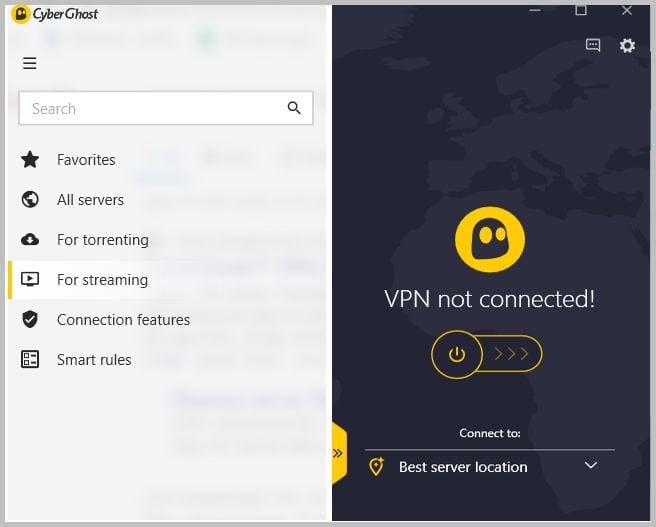
This feature adds to its ease of use and guarantees reliability for these two activities. And the streaming servers are optimized for specific platforms so you can hop onto the best servers for Netflix US, BBC iPlayer, and more. These servers guarantee you fast access and connections every time—my speed and streaming tests showed that.
I would like to see obfuscated servers added to the list, though. These types of servers hide your VPN usage altogether so you can spoof your location and access geoblocked sites even in heavily restricted regions, like Turkey and China. I’ve seen other services, like NordVPN, offer specialized Tor servers, too. There’s room for improvement, but any specialized servers are a huge advantage.
Does CyberGhost Offer Static/Dedicated IP Addresses?
Yes. CyberGhost has dedicated IP addresses, but only in eight locations: two cities in each the UK, the US, and Germany, as well as one city in each France and Canada.
You can purchase a dedicated IP address on top of your subscription. It can be useful for avoiding blacklists and geoblocks since it’s harder for sites to detect that you’re using a VPN when no one else is sharing the same server.
Apps, Extensions, and Compatibility
No matter what device you’re using, there’s most likely a CyberGhost app to download. The service works with all major devices. But if you’re on iOS or Android mobile, there are a few clear differences you need to be aware of.
iOS and Android Apps
CyberGhost’s iOS and Android apps are quick to download and easy to set up. I was able to download and connect to a server in less than three minutes. You simply decide whether to allow push notifications, configure VPN network settings, and then press Connect. A closer look at the individual apps, though, revealed something interesting.
The Android app is very similar to the desktop version. It still has the ad, malware, and tracking blockers, WiFi protection, and split tunneling capability (though this is called Exceptions on the desktop app). It even has a data compression feature that compresses images and other elements on a page to reduce your internet usage. But the iOS app? You won’t find any of that.
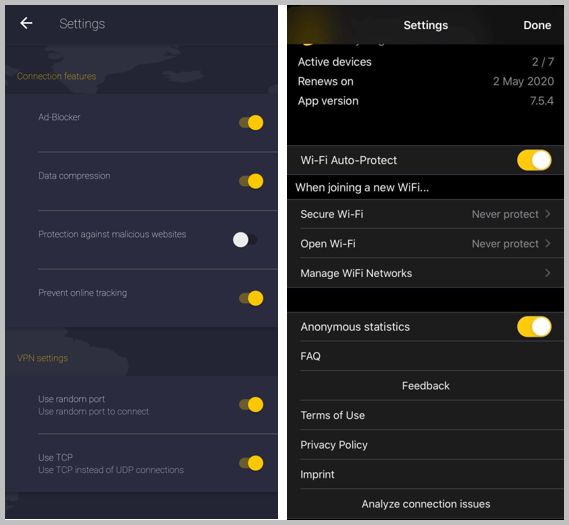
The iOS app has WiFi protection, and that’s it. If you head over to the settings tab, you won’t find any toggles for ad blockers or split tunneling. So if you’re an iOS user, you’re better off sticking with the desktop app than going mobile.
The lack of consistency between the two apps is disappointing. If you still want to find a feature-rich app for your iPhone or iPad, check out our recommendations of the best iOS VPNs.
As is the case with most VPNs, the desktop app has a few more features than mobile. There’s HTTPs Redirect and DNS/IPv6 leak protection, for example. That’s not to say the mobile apps are not secure, though—they still use advanced encryption to keep you securely anonymous.
Browser Extensions
CyberGhost has completely free browser extensions for Firefox and Chrome. As expected, though, free does mean that they come with some limitations.
You can install the extensions straight to your browsers as lightweight options for encrypting your browser traffic. This means anything you do outside of Chrome or Firefox stays unencrypted with your local IP address.
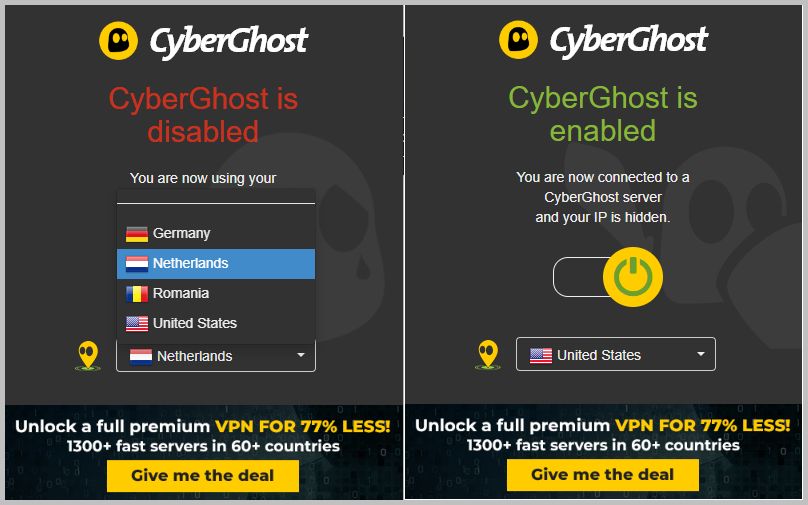
Free or not, CyberGhost’s browser extensions don’t compromise on security. They come with completely anonymous browsing, no-logs, WebRTC leak protection, online tracking blockers, malicious content blockers, and WiFi security.
And they’re reliable for bypassing geoblocks, too. I tested Netflix US and Amazon Prime Video, and I was able to access both from the UK. You also have unlimited bandwidth to maintain fast, steady speeds.
However, you don’t get extra features like the automatic kill switch, simultaneous connections, and 24/7 live chat support. You also only have access to 8 servers in 4 countries—not the full 6,400+ server network. The servers you can use are located in the US, Germany, the Netherlands, and Romania.
For free extensions, CyberGhost offers a lot. Most vendors don’t give away their browser addons for free, so this is a bonus. But the features you get are pretty limited when you compare it to the other browser extensions out there. The addons are supposed to be testers before you sign up for the full VPN, and that’s all I’d recommend them for, too.
If you want a premium browser extension without restrictions, check out our top recommendations for Chrome instead.
Router App
CyberGhost is compatible with routers that support OpenVPN. You can manually configure the VPN onto your router using the step-by-step guides on CyberGhost’s website. There are different guides for different devices, so you should find the one you need. I followed the tutorials for OpenVPN on my DD-WRT router, and it was straightforward enough.
You can also purchase a FlashRouter that already has the CyberGhost app installed so you don’t need to configure anything yourself. I’d definitely consider this option if you’re new to VPNs and aren’t sure where to start or just don’t want to run the risk of installing it incorrectly.
Breaking Geoblocks: Can it Work in China?
No. This is probably one of CyberGhost’s biggest downfalls. Although it has servers in China, it doesn’t actually work there. You can use the Chinese servers to access domestic sites from outside China, but it doesn’t work in reverse.
We know breaking through the Great Firewall of China isn’t easy, but I expected more from CyberGhost. As always, we’ll keep retesting. But if you need a VPN for China right now, check out one of these leading vendors instead.
Want to learn even more? Go back to the topic list.
How Many Devices Can I Connect With CyberGhost?
You have seven simultaneous connections with a CyberGhost subscription, and it works on most popular devices including Windows, Android, Linux, iOS, smart TVs, game consoles, browsers, and routers.
You can get unlimited simultaneous connections by installing the VPN on a router. This lets you share your subscription with your whole household. For this to work, your router has to be OpenVPN compatible.
Comparison: Is It Better Than the Competition?
There are two other vendors out there that consistently compete with CyberGhost for the top spot—ExpressVPN and NordVPN. Each service’s plans are priced differently, yet they offer similar features. So which one really wins?
| CyberGhost | ExpressVPN | NordVPN | |
| Our speed rating | #5 | #2 | #1 |
| Server number | 6,400+ | 3,000+ | 5,390+ |
| Obfuscated servers | No | Yes | Yes |
| Specialized servers | Yes, for streaming and torrenting | No | Yes, for P2P, Dedicated IP, Double VPN, Obfuscated, and Onion Over VPN |
| Jurisdiction | Romania | British Virgin Islands | Panama |
| Zero-logging policy | Yes | Yes | Yes |
| Encryption | 256-bit AES | 256-bit AES | 256-bit AES |
| Kill switch | Yes, for all devices | Yes, but not for iOS | Yes, for all devices |
| Split tunneling | Dedicated feature on mobile and similar on desktop | Yes, for mobile and desktop | No |
| Allows torrenting | Yes, specialized P2P servers | Yes, on all servers | Yes, specialized P2P servers |
| Simultaneous connections | 7 | 5 | 6 |
| Unblocks Netflix US | Yes, optimized Netflix servers | Yes | Yes, specialized streaming servers |
| Unblocks BBC iPlayer | Yes, optimized BBC iPlayer servers | Yes | Yes, specialized streaming servers |
| Works in China | No | Yes | Yes |
| Pricing | From $2.75/month | From $8.32/month | From $3.71/month |
| Money-back guarantee | Up to 45 days | 30 days | 30 days |
| Features | Details |
|---|---|
| Number of countries with servers | 90 |
| Number of servers | 6400 |
| Number of IP addresses | 4500 |
| Does VPN keep logs? | No |
| Does VPN include a kill switch? | Yes |
| Number of devices per license | 7 |
If ease of use is what you’re after, CyberGhost has you covered. I found the apps simple to use and navigate, and they’re full of extra features that make your whole VPN experience much smoother and quicker.
After logging in, simply hit the power button to connect to the best server for your location. You can also use the drop-down to find servers optimized for torrenting and streaming platforms. Manually finding and connecting to servers is another easy option—use the search function to type in the location you’re after. Add servers to your favorites list to make connecting next time even quicker.
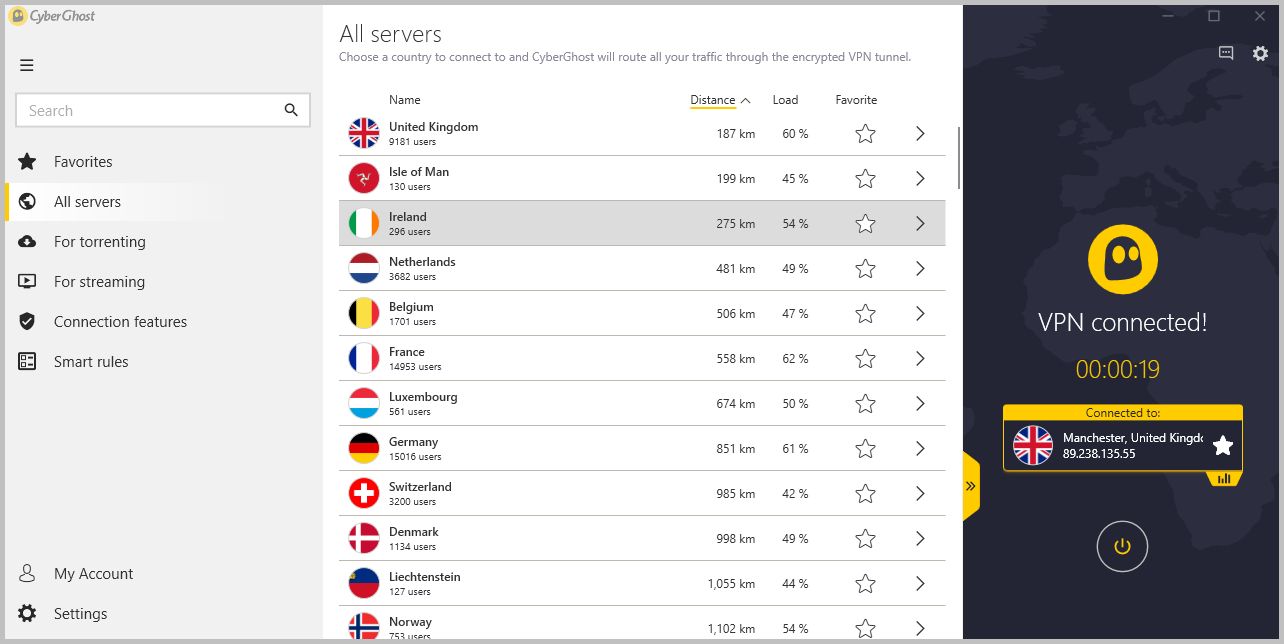
You can see the number of users on each server, as well as the load percentage and distance from your location. It adds a personalized touch to the app, but it also means you aren’t connecting and disconnecting trying to find a reliable connection. It’s easy to see the best server for your needs.
Changing your general settings is as simple
What’s New in the cyberghost crack Archives?
Screen Shot

System Requirements for Cyberghost crack Archives
- First, download the Cyberghost crack Archives
-
You can download its setup from given links:





